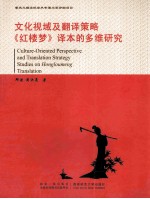图书介绍
文化视域及翻译策略 《红楼梦》译本的多维研究PDF|Epub|txt|kindle电子书版本网盘下载

- 邱进,周洪亮著 著
- 出版社: 西南师范大学出版社
- ISBN:
- 出版时间:2011
- 标注页数:476页
- 文件大小:128MB
- 文件页数:484页
- 主题词:红楼梦-文学-翻译-研究
PDF下载
下载说明
文化视域及翻译策略 《红楼梦》译本的多维研究PDF格式电子书版下载
下载的文件为RAR压缩包。需要使用解压软件进行解压得到PDF格式图书。建议使用BT下载工具Free Download Manager进行下载,简称FDM(免费,没有广告,支持多平台)。本站资源全部打包为BT种子。所以需要使用专业的BT下载软件进行下载。如BitComet qBittorrent uTorrent等BT下载工具。迅雷目前由于本站不是热门资源。不推荐使用!后期资源热门了。安装了迅雷也可以迅雷进行下载!
(文件页数 要大于 标注页数,上中下等多册电子书除外)
注意:本站所有压缩包均有解压码: 点击下载压缩包解压工具
图书目录
Part One Translation and Culture:Contrastive Study on the Yangs'and Hawkes'VersionsChapter One Introduction3
1.1 Hongloumeng and Its English Translation3
1.2 The Research Questions9
1.3 The Format of This Book11
Chapter Two Literature Review14
2.1 Previous Researches into the Translation of Hongloumeng14
2.2 The Functional Approach of Translation Study17
2.3 Previous Researches of Functionalism in Literary Translation25
Chapter Three Research Methodology28
3.1 A Sketchy View on the Action Theory28
3.2 The Functionalist Translation Theory31
3.3 Peter Newmark's Semantic Translation and Communicative Translation56
3.4 Language,Culture and Translation Strategy from a Cultural Studies Perspec-tive59
3.5 The Validity of the Theories Applied to This Study68
Chapter Four Contrastive Study of the Translation of Culture-Specific Elements in the Two Versions71
4.1 Introduction71
4.2 Different Roles and Functions in the Translational Actions of Hongloumeng72
4.3 Different Translation Briefs and Skoposi of the Two Versions73
4.4 Contrastive Study of the Translation of Culture—Specific Elements of the Two Versions82
Chapter Five Optimal Balance between the Two Translation Strategies:Foreignization vs.Domestication139
5.1 The Yangs' Main Translation Methods Underpinned by Their Translation Strategy139
5.2 Hawkes' Main Translation Methods Based on His Translation Strategy140
5.3 Appropriate Degree of Foreignization and Domestication in the Two Versions142
5.4 Major Findings154
Appendix:《红楼梦》两种英译本异化与归化的调查问卷163
Chapter Six Poetry Translation in Hongloumeng173
6.1 Poetry Translation173
6.2 Poetry in Hongloumeng178
6.3 Functionalist Approach to Poetry Translation in Hongloumeng181
6.4 Other Factors Affecting the Translator's Choice of Translation Strategy212
Chapter Seven Translation of Lantern Riddles in Hongloumeng217
7.1 Introduction217
7.2 Lantern Riddles in Hongloumeng218
7.3 A General Notion of the Translator's Subjectivity223
7.4 A Contrastive Study on Lantern Riddles Translation from the Perspective of the Translator's Subjectivity233
7.5 Further Discussion about the Translator's Subjectivity253
Chapter Eight Translation of Two—Part Allegorical Sayings in Hongloumeng255
8.1 Introduction255
8.2 Description of Two—Part Allegorical Sayings256
8.3 Nida's Equivalence Theory258
8.4 Translation Methods Adopted in the Two Versions261
8.5 Approaches to Image—Rendering267
Chapter Nine Translation of Cultural Default in Hongloumeng270
9.1 Cultural Default270
9.2 Analysis of Cultural Default in Hongloumeng275
9.3 Translation of Cultural Default in Hongloumeng282
Chapter Ten The Impact of the Translator's Hybrid Cultural Identity on Cultural Translation of Hongloumeng303
10.1 Introduction303
10.2 The Hybridity of Cultural Identity304
10.3 The Hybridity of Cultural Identity of Hongloumeng Translators313
10.4 The Hybridity of Cultural Identity and Manipulation of Cultural Informa-tion in Hongloumeng Translation315
Part Two Sociosemiotics and Stylistics:The Study on A Dream of Red MansionsChapter Eleven Translation of Color Terms in A Dream of Red Mansions329
11.1 Introduction329
11.2 Translatability and Untranslatability of Color Terms330
11.3 The Categorization of Color Terms in Hongloumeng333
11.4 Color Images in Hongloumeng335
11.5 Translation Principles of Color Terms and Color Images in Hongloumeng343
Chapter Twelve Translation of Fuzzy Expressions in A Dream of Red Mansions349
12.1 Introduction349
12.2 The Notion of Fuzzy Equivalence350
12.3 Translation of Fuzzy Metaphorical Expressions in Hongloumeng352
12.4 Translation of Fuzzy Numerals in Hongloumeng356
12.5 Translation of Fuzzy Animal Words in Hongloumeng360
Chapter Thirteen Translation of Metonymy in A Dream of Red Mansions364
13.1 Brief Description of Metonymy364
13.2 Metonymy,Culture and Translation368
13.3 Comparisons between Chinese and English Metonymy Models369
13.4 Translation Methods of Metonymy in A Dream of Red Mansions371
Chapter Fourteen Sociosemiotic Study of A Dream of Red Mansions380
1 4.1 The Sociosemiotic Approach to Translation Studies380
14.2 Analysis of the Yangs' Version from the Sociosemiotic Perspective385
Chapter Fifteen A Stylistic Study of A Dream of Red Mansions404
15.1 Introduction to Literary Stylistics405
15.2 Narration407
15.3 Conversation415
15.4 Chapter Titles422
Part Three Hermeneutics and Rewriting:The Study on The Story of the Stone431
Chapter Sixteen The Study on The Story of the Stone from a Hermeneutic Perspective431
16.1 Introduction431
16.2 Gadamer's Hermeneutic Theory432
16.3 The Hermeneutic Approach of The Story of the Stone438
Chapter Seventeen Allusion Translation in The Story of the Stone from the Approach of Rewriting Theory448
17.1 Introduction448
17.2 Allusions in Hongloumeng449
17.3 André Lefevere's Rewriting Theory455
17.4 Theoretical Analysis on Allusion Translation in The Story of the Stone461
REFERENCES467
LIST OF ABBREVIATIONS475
ACKNOWLEDGEMENTS476